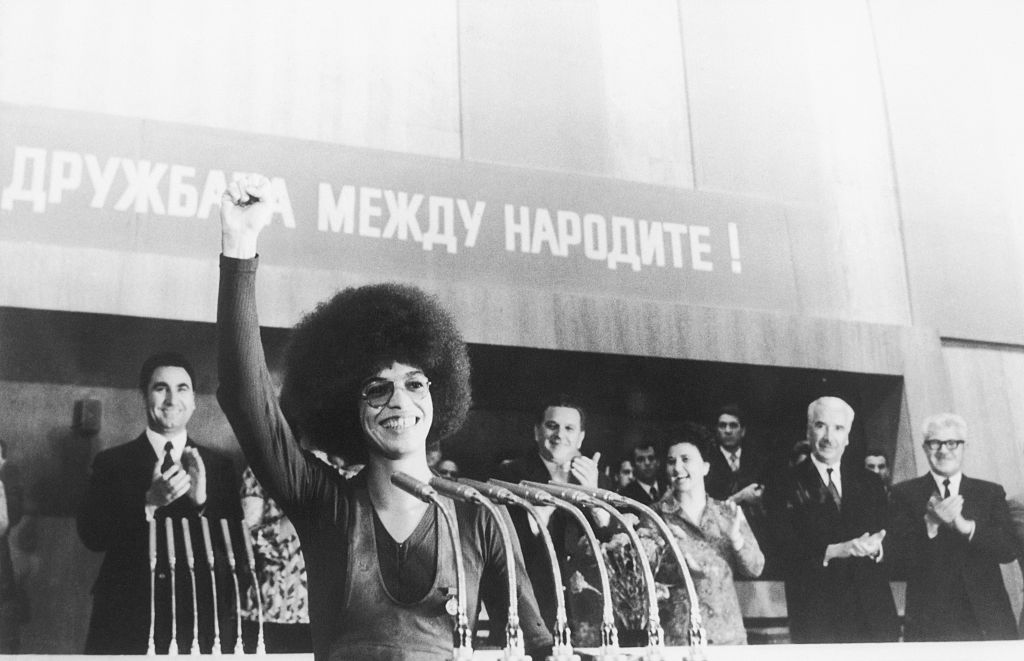
Angela Davis earns warm applause from her audience in the University Hall during a meeting held in honor of her visit to Bulgaria. | Source: Bettmann / Getty
Iconic Black power activist Angela Davis is known for many things, but being at a loss for words is not one of them.
The celebrated scholar and revolutionary activist preached what she practiced and documented her life as well as her views about women, race, class and politics on the pages of more than 10 books that she has authored. More times than not, the quotes from those books — published between 1971 and 2019 — still resonate in 2022, and likely will continue to do in the years and decades to come.
Not familiar with Davis’ books? Keep reading to find a sampling of quoted excerpts from a selection of Angela Davis’ books that address women, race and class in the context of Black feminism and prison abolitionism.
If They Come in the Morning: Voices Of Resistance (1971)
“The very institutions which condemned Nat Turner and reduced his struggle for freedom to a simple criminal case of murder, owed their existence to the decision, made a half century earlier, to take up arms against the British oppressor.”
“Yes, I am a Communist. And I will not take the fifth amendment against self-incrimination, because my political beliefs do not incriminate me, they incriminate the Nixons, Agnews, and Reagans.”
“There is a distinct and qualitative difference between one breaking a law for one’s own individual self-interest and violating it in the interests of a class or a people whose oppression is expressed either directly or indirectly through that particular law. The former might be called a criminal (though in many instances he is a victim), but the latter, as a reformist or revolutionary, is interested in universal social change. Captured, he or she is a political prisoner.”
“We should seek out all the doors which still remain ajar, however slight the opening might be.”
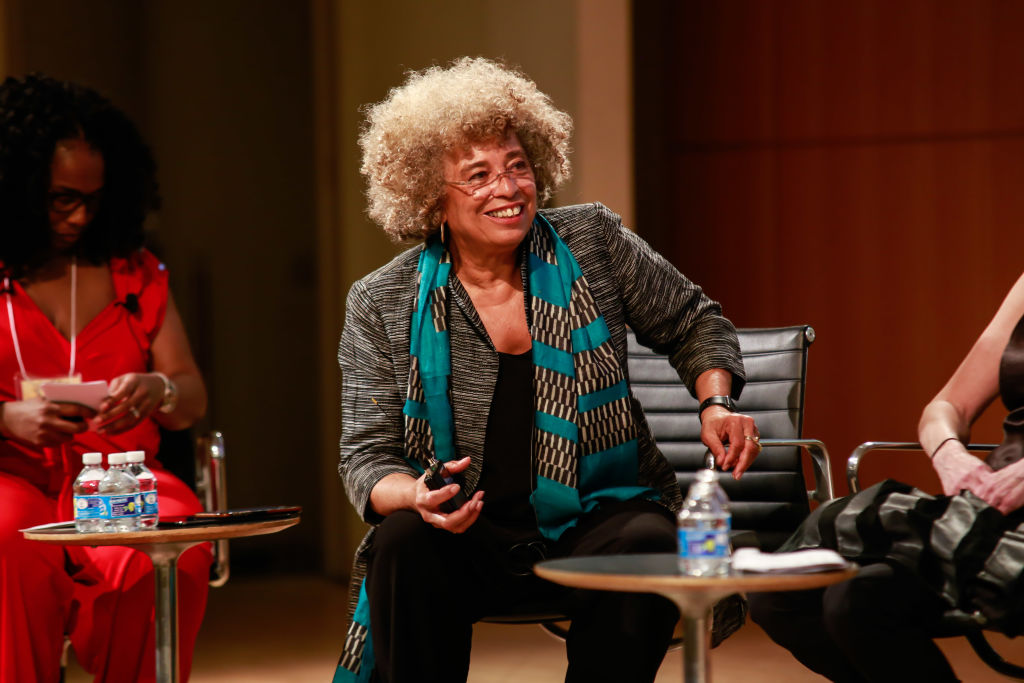
Angela Davis attends the Groundswell at 20, with Angela Davis at CUNY Graduate Center on April 6, 2017, in New York City. | Source: Gonzalo Marroquin / Getty
Angela Davis: An Autobiography (1974)
“Some years back, Black visitors to Birmingham had all of three post cards from which to choose if they wanted a souvenir of the Black section of the city. Sixteenth Street Baptist Church. Parker High School. A. G. Gastons Funeral Home. Perhaps the white people who made the photographs and retouched them in bright reds and yellows had decided that our lives could be summarized by church, school and funerals. Once we were born, we got religion and a sprinkling of learning; then there was nothing left to do but die..”
Work hard and you will be rewarded. A corollary of this principle was that the road would be harder and rockier for Black people than their white counterparts. Our teachers warned us that we would have to steel ourselves for hard labor and more hard labor, sacrifices and more sacrifices. Only this would prove that we were serious about overcoming all the obstacles before us. It often struck me they were speaking of these obstacles as if they would always be there, part of the natural order of things, rather than the product of a system of racism, which we could eventually overturn.
“Many times before, movement leaders and activists had been felled by the bullets of police, conscious agents or crazy, confused brothers who let themselves be used. We had cried before, we had attended funerals before, and we had felt and expressed rage at seeing the life of a brother, a comrade, so cruelly blown out of him. We knew that for the moment our commitment meant that we were chained to a vicious circle of violence—in this way our enemies were trying to force us to retreat in fear. In a sense, therefore, we always expected the violence, we knew it was coming, though we could never predict the next target. Yet each time it struck, it was equally devastating to us. No matter how many times it was repeated, there was no getting used to it.”
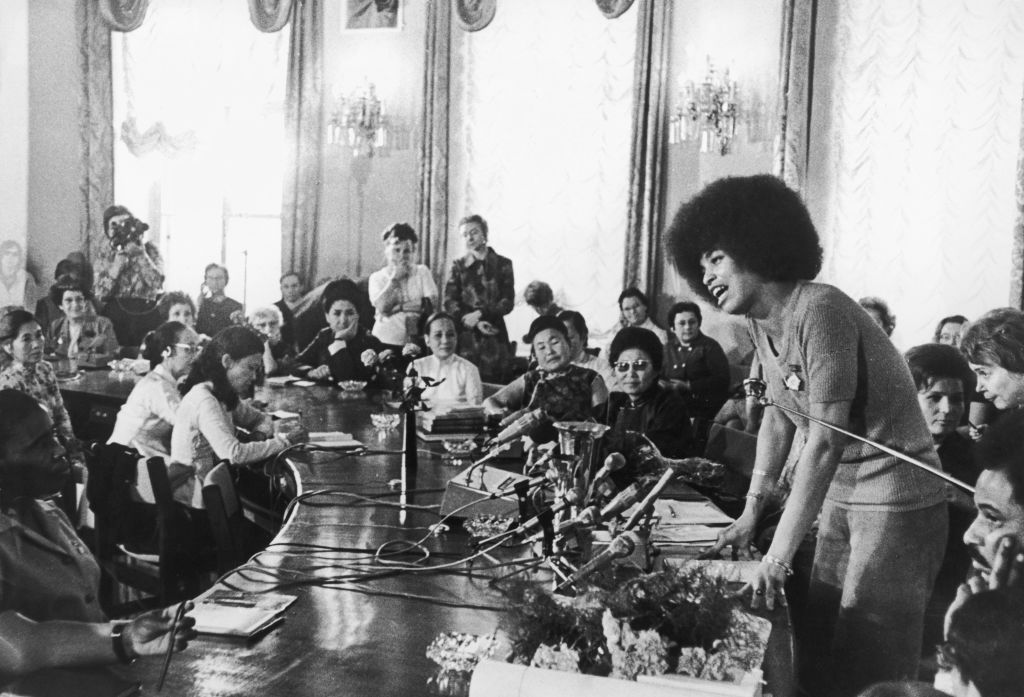
American activist and philosophy professor Angela Davis, Central Committee member of the Communist Party of America, addresses the Soviet International Women’s Seminar in Moscow, September 4, 1972. | Source: Express / Getty
Women, Culture & Politics (1990)
“We must begin to create a revolutionary, multiracial women’s movement that seriously addresses the main issues affecting poor and working-class women.”
“We cannot grasp the true nature of sexual assault without situating it within its larger sociopolitical context. If we wish to comprehend the nature of sexual violence as it is experienced by women as individuals, we must be cognizant of its social mediations.”
“The roots of sexism and homophobia are found in the same economic and political institutions that serve as the foundation of racism in this country and, more often than not, the same extremist circles that inflict violence on people of color are responsible for the eruptions of violence inspired by sexist and homophobic biases. Our political activism must clearly manifest our understanding of these connections.”
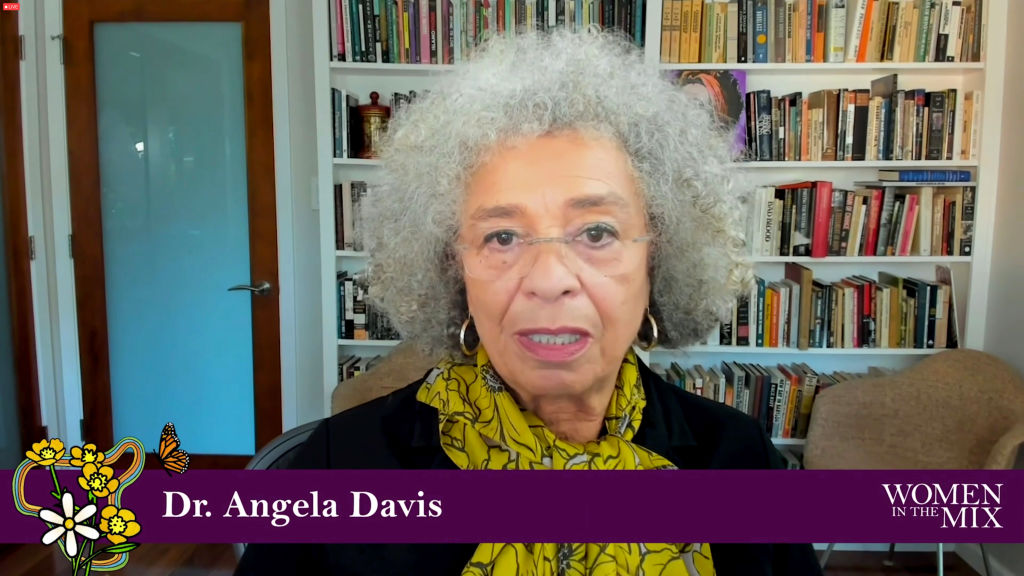
In this screengrab, Dr. Angela Davis attends Women in the Mix during the 63rd Annual GRAMMY Awards on March 08, 2021 | Source: Jamie McCarthy / Getty
Women, Race and Class (1991)
“If Black people had simply accepted a status of economic and political inferiority, the mob murders would probably have subsided. But because vast numbers of ex-slaves refused to discard their dreams of progress, more than ten thousand lynchings occurred during the three decades following the war.”
“Judged by the evolving nineteenth-century ideology of femininity, which emphasized women’s roles as nurturing mothers and gentle companions and housekeepers for their husbands, Black women were practically anomalies.”
“Expediency governed the slaveholders’ posture toward female slaves: when it was profitable to exploit them as if they were men, they were regarded, in effect, as genderless, but when they could be exploited, punished and repressed in ways suited only for women, they were locked into their exclusively female roles.”
“If Black people had simply accepted a status of economic and political inferiority, the mob murders would probably have subsided. But because vast numbers of ex-slaves refused to discard their dreams of progress, more than ten thousand lynchings occurred during the three decades following the war.”
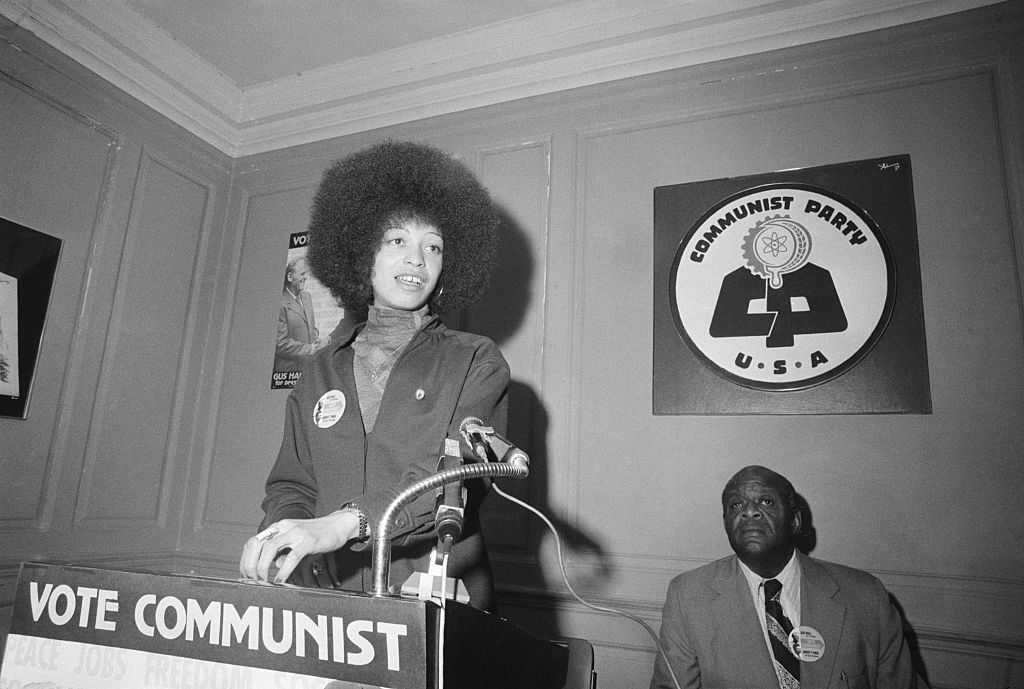
Angela Davis, Communist leader, shown speaking at a press conference at the Communist’s National Party Headquarters in New York City on February 18, 1976. | Source: Bettmann / Getty
Are Prisons Obsolete? (2003)
“Deviant men have been constructed as criminal, while deviant women have been constructed as insane.”
“The lawbreaker is thus no longer an evil-minded man or woman, but simply a debtor, a liable person whose duty is to take responsibility for his or her acts, and to assume the duty of repair.”
“The belief in the permanence of slavery was so widespread that even white abolitionists found it difficult to imagine black people as equals.”
“Mass imprisonment generates profits as it devours social wealth, and thus it tends to reproduce the very conditions that lead people to prison. There are thus real and often quite complicated connections between the deindustrialization of the economy—a process that reached its peak during the 1980s—and the rise of mass imprisonment, which also began to spiral during the Reagan-Bush era.”
“Despite the important of antiracist social movements over the last half century, racism hides from view within institutional structures, and its most reliable refuge is the prison system.”
“White antislavery abolitionists such as John Brown and William Lloyd Garrison were represented in the dominant media of the period as extremists and fanatics.”
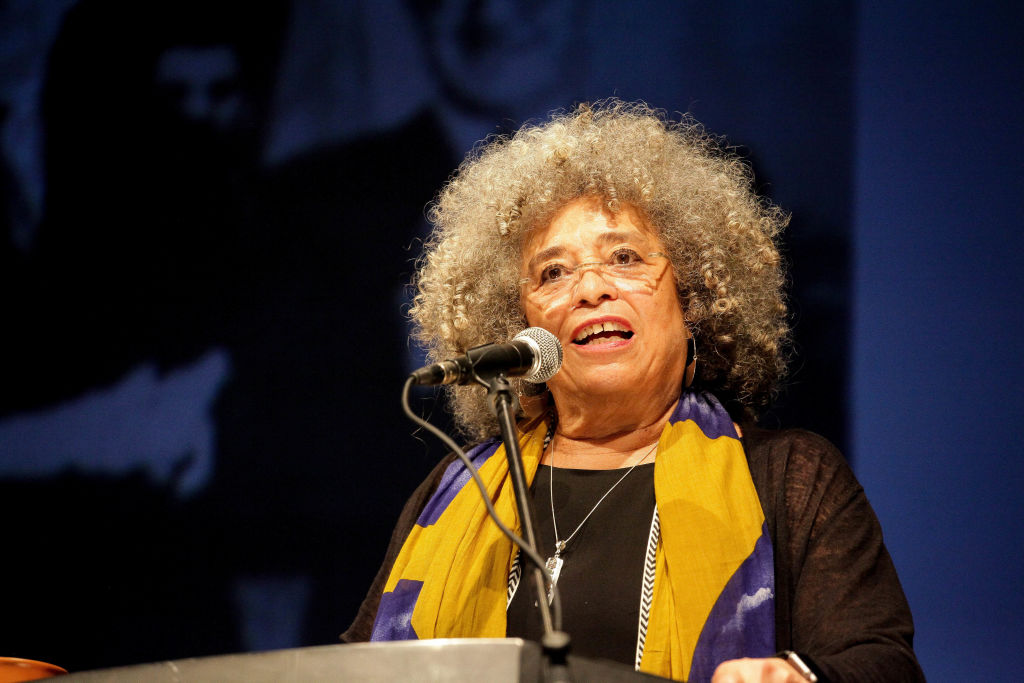
Angela Davis seen during her speech in Montevideo for International Women’s Day on March 8, 2019. | Source: SOPA Images / Getty
Abolition Democracy: Beyond Empire, Prisons, and Torture (2005)
“Communities are always political projects, political projects that can never solely rely on identity.”
“DuBois pointed out that in order to fully abolish the oppressive conditions produced by slavery, new democratic institutions would have to be created. Because this did not occur; black people encountered new forms of slavery—from debt peonage and the convict lease system to segregated and second-class education. The prison system continues to carry out this terrible legacy. It has become a receptacle for all of those human beings who bear the inheritance of the failure to create abolition democracy in the aftermath of slavery. And this inheritance is not only born by black prisoners, but by poor Latino, Native American, Asians, and white prisoners. Moreover, its use as such a receptacle for people who are deemed the detritus of society is on the rise throughout the world.”
“This movement was something so extraordinary, not only because it saved my life—and that was a major accomplishment—but also because it demonstrated that change was possible as a result of organized, mass pressure.”
“How can we produce a sense of belonging to communities in struggle that is not evaporated by the onslaught of our everyday routines? How do we build movements capable of generating the power to compel governments and corporations to curtail their violence?”
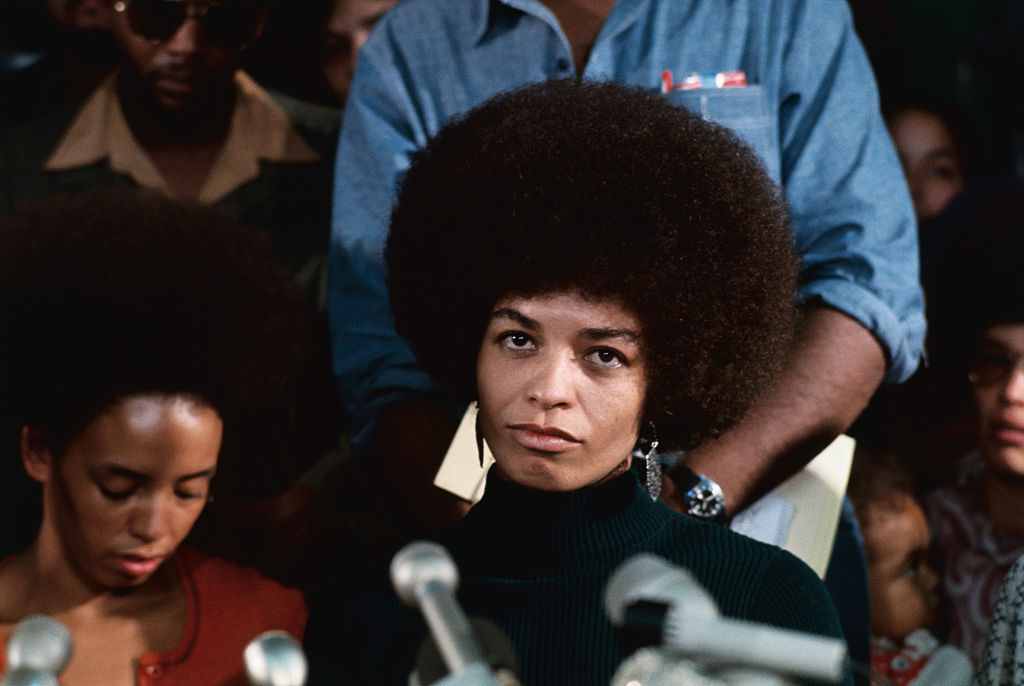
Angela Davis, militant on trial for alleged activities in connection with Marin County Court shootout, attends her first news conference since being released on bail, February 24th. | Source: Bettmann / Getty
Freedom Is A Constant Struggle: Ferguson, Palestine, and the Foundations of a Movement (2015)
“I feel that if we don’t take seriously the ways in which racism is embedded in structures of institutions, if we assume that there must be an identifiable racist who is the perpetrator, then we won’t ever succeed in eradicating racism.”
“Anyway I don’t think we can rely on governments, regardless of who is in power, to do the work that only mass movements can do.”
“It is essential to resist the depiction of history as the work of heroic individuals in order for people today to recognize their potential agency as a part of an ever-expanding community of struggle. What”
“When Black women stand up— as they did during the Montgomery Bus Boycott—as they did during the Black liberation era, earth-shaking changes occur.”
“In many ways you can say that the prison serves as an institution that consolidates the state’s inability and refusal to address the most pressing social problems of this era.”
SEE ALSO:
Honoring Angela Davis, The Revolutionary Activist, Academic And Author
Angela Davis’ Collection Of Work Will Live At Harvard University
Angela Davis’ Top Quotes From Her Iconic Books About Women, Race And Class was originally published on newsone.com
















